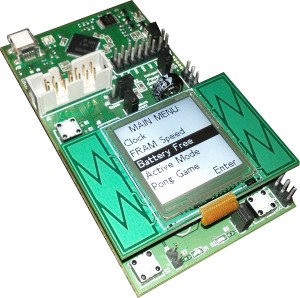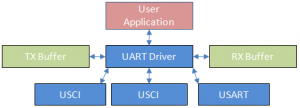43oh just came with a post showing the new MSP430 Wolverine that is coming out really soon. This is an expanded version of the MSP430 using FRAM instead of Flash.
Source – 43oh.com
TI Has done some pretty interesting things on the board. An e-ink display with capacitive touch. E-ink is a very good pairing with the MSP430 because they’re both targeted towards low power. E-ink displays can hold on to the last data displayed for extended periods of time without the need for power, and this works great for a lot of applications. Although the board is greenish, the actual board released will most likely have a different color scheme.
Despite all this I want to discuss something that we don’t see anymore. Take a look at the back of the board. This is the area usually reserved by TI for the on-board FET debugger.
I’ve been using the MSP430 for over 5 years and for all that time the FET has been built around an MSP430 paired with a TUSB3410 USB to UART, as well as EEPROM and a few external elements. On the Wolverine board, this isn’t there. The markings are not clear, but I believe TI has finally integrated the FET. The main chip that is at an angle is likely an MSP430 with integrated USB capabilities. There’s no longer a need to use an external TUSB3410 device, so the BOM is lower. It makes supporting the platform better. You can use DFU or other mechanisms and its a nice way to display the MSP430 USB capabilities.
The F5529 Launchpad board changed things a bit. The TUSB3410 was replaced by a TUSB2046.
Soon we’ll know.

